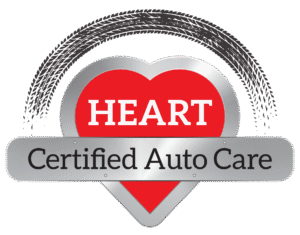How to Choose the Right Gas at the Gas Station
Gas stations are more complicated than they seem. There are so many options to choose from — diesel or regular, leaded or unleaded, is premium gas worth it — and what is gas octane, anyway?
To take the guesswork out of filling up, here are some tips, insights, suggestions, and advice on picking the right gas for your vehicle.
Common Car Fuel Questions
Which Gas Should I Use?
More often than not, you should just use regular 87 octane. Your owner’s manual will tell you the right octane. Some cars require premium gas. If so, definitely use that, for reasons we’ll explain below.
When Should I Use Regular Gas?
If your car is designed for regular 87-octane gas, then that’s what you should use—and it will not damage your engine. While it’s tempting to think premium gas is better, the truth is that it doesn’t help at all. Consult your owner’s manual to see what type of fuel is best for your car, or stop by one of HEART Certified Auto Care’s three convenient locations in Evanston, Northbrook, and Wilmette and our excellent technicians would be happy to help you find the right answer.
When Should I Use Premium Gas?
Only if your owner’s manual specifically indicates “premium fuel required.” Using low octane gas could cause damage in a car that requires premium fuel.
Octane Rating
What is Octane Rating?
Technically, octane rating measures how much compression a fuel can take before combustion. In other words, it’s the fuel’s ability to avoid “engine knocking,” when gas ignites on its own, rather than from the sparkplug, which can lead to engine damage.
What are the different gas octanes?
Octane is typically described as regular (87), midgrade (88-90) or premium (91-94). Higher elevation gas stations often carry 85 octane, which burns better in thinner air.
Why do some manufacturers recommend higher octane?
Some engines need supercharge or a higher compression ratio—the amount of internal pressure and air needed to efficiently ignite the fuel—which requires a higher octane gas.
What happens if I use lower octane fuel than my car needs?
Using a lower octane fuel puts added strain on the engine and emissions controls, leading to possible car repairs. Avoid breakdowns and unwanted trips to your local auto repair shop by always using the right octane.
Does high octane gas improve fuel economy?
Sometimes, but not always. Typically, using higher octane will have zero benefit during normal driving. It may help performance and gas mileage if you’re towing a heavy load or driving in particularly hot climates, but it would be minimal.
Is High Octane Gas Worth the Cost?
Definitely use higher octane fuel if your car requires it, cost aside. If your car can take either higher or lower octane, then it’s your choice. It may help your car run more efficiently, but the cost will be higher. Higher octane fuel can decrease CO2 emissions, which lowers your carbon footprint.
What are RON 95 and RON 98 octanes?
Like shoe sizes, European and U.S. octane measurements are different. European cars often recommend RON 95 or RON 98 gas, which isn’t available here. Their U.S. equivalents are 87 octane and 94 octane, respectively.
High Altitude
Why is lower octane gas used in high altitudes?
A lot of high altitude gas stations sell only lower octane fuel. This is an old school approach for old school cars that couldn’t adjust to the thinner air. Modern cars—anything built after 1975—automatically adjusts combustion in high altitude. You should still try to find an octane closest to your suggested amount. If you need premium gas, be sure to fill up before you hit the road— you may also want to check your tires and get an oil change while you’re at it, in case you can’t find any once you arrive. If you start to run low, fill up ASAP; your remaining high octane fuel will help even out the low octane fuel you add.
Diesel and E85
What if my car is a diesel engine?
Then, you must use diesel gas. Your engine processes and burns fuel differently than standard engines and using regular gas will, without a doubt, lead to needed repairs.
What is E85 fuel?
A mixture of ethanol and gasoline, E85 emits less pollution but has lower fuel economy. It should only be used on cars designed for E85 fuel — usually designated by a bright yellow fuel cap. Using it on other cars can lead to damage.
Does Ethanol Help Boost Octane?
It does indeed. Ethanol’s octane rating is far higher than gas—around 109, versus 87—and is often mixed with gasoline to help boost your fuel’s overall octane. Though once rare, this mixture’s becoming more prevalent and popular. Check your manual to see if ethanol infused fuel’s right for you.
If you have further questions about your car headlights, or any other car repair matter, call or stop by HEART Certified Auto Care for our mechanics to inspect your automobile. It could mean the difference between a smooth trip and the ditch.




